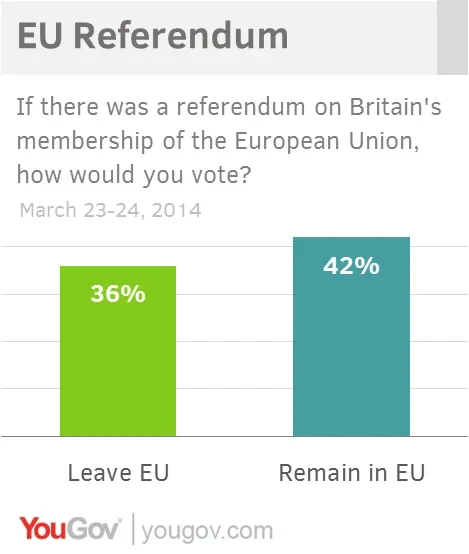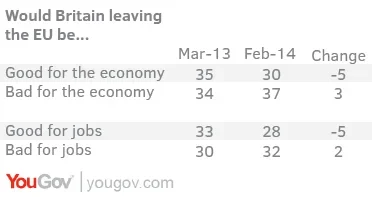Ahead of tonight's first Europe debate between Nick Clegg and Nigel Farage how do the public stand on the European Union?

We ask two groups of fortnightly questions on how people would vote in a referendum on Europe, and whether people think leaving the European Union would be good or bad for Britain's economy, job or influence in the world.
Back in 2012 we were regularly seeing strong leads for those who wanted Britain to leave the European Union, but since David Cameron's referendum pledge in January 2013 the position has tightened up. Our last few polls have even shown more support for staying in the European Union than leaving. On Monday we found 42% of people would vote to stay in the European Union, 36% would vote to leave – the six point lead for those wanting to stay in the Union is the largest we've found since January 2012.
In the event that David Cameron did secure a renegotiation the gap would be much bigger – people would overwhelmingly supporting staying in the European Union by 54% to 25%; though of course, this does rather depend on what sort of renegotiation people are envisaging.
By 40% to 13%, people think that Britain would have less influence if we left the European Union, a view that has remained broadly steady over the last year. Opinions on the effect leaving the EU would have on jobs and the economy though have gradually shifted. A year ago 33% though that leaving the EU would be good for British jobs, 30% bad for British jobs, similarly 35% thought EU exit would be good for the economy, 34% bad. Over the year those opinions have gradually shifted, and when we last asked at the end of February people were slightly more likely to think leaving the EU would be bad for both jobs and the wider economy.

Asked about how leaving the European Union would affect them personally slightly more people think it would leave them worse off (21%) than better off (19%), but a far bigger group (43%) think it would make no difference to their own finances.
Image: Getty





